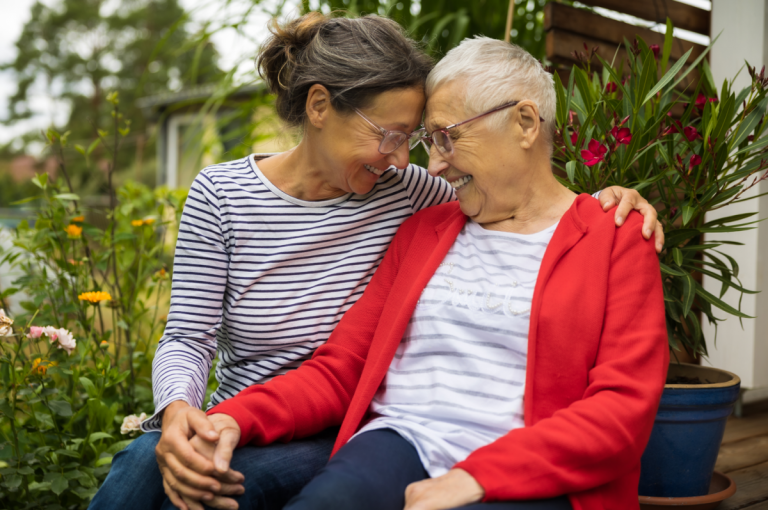Caring for Those We Love: What Is Caregiver Burnout?
Here at The Pavilion at Great Hills we celebrate all the mothers, fathers, and grandparents who were always there for us, giving love and support.
Remember when you crashed your bicycle and cut your elbow, she was there for you with bandages, Bactine, and kisses to make it better. When you got your heart broken, he picked you up from the dance and took you out for three scoops of mint chocolate chip. Through the years, the decades, the moments of life — happy, and sad… your mom and dad were always there for you, because a parent’s love for their child is the greatest love of all.
And as the journey of our lives rolls on, the tables are often turned — a child once cared for becomes the caregiver as Mom or Dad ages. They were there for you and you love them and want to return all that love and support now that they need you in ways they never have before.
For many Americans this is the case currently, but for scores more it will be a reality soon. The generations are aging and those of a certain age may experience physical and/or mental challenges that will require them to have partial or 24-hour care.
Burnout, as defined by Apple dictionary, is a ‘physical or mental collapse caused by overwork or stress’ and that’s exactly what can happen when caregiver burnout overwhelms someone. It’s a problem that must be addressed, and a problem that could be on the rise. According to information compiled by the AARP and the National Alliance for Caregiving, 53 million adult Americans serve as unpaid family caregivers. That’s 1 caregiver for every 5 adult Americans. But what exactly does caregiver burnout look like, and who does it affect? Could it happen to you? Is it happening right now?
The unfortunate truth is, caregiver burnout can happen to anyone who spends a considerable amount of time providing care for a loved one and it can impact them physically, emotionally, and/or mentally. It can also arise suddenly or slowly build over time. And because caregivers are typically the kind of people who give of themselves freely, often to the point of neglecting their own needs, they are at high risk for caregiver burnout.
Five Signs You May Be Experiencing Caregiver Burnout
As with any problem, condition, or situation, it’s always best to recognize what’s happening early on if you can, and deal with it. So, as you read this blog consider your life as a caregiver and take stock of your current physical, emotional, and mental state. Caregiver burnout can exhibit similar symptoms to clinical depression, and either can certainly exacerbate the other, so it’s important to talk to your doctor if you’re feeling any symptoms that feel overwhelming.
The following five signs of caregiver burnout are perhaps some of the most common, but there are many more. And remember, there’s no need to panic or feel additional stress if you believe one or more of the five relates to you because in most cases, you can alleviate or even eradicate your caregiver burnout symptoms with the appropriate solution or help, so there’s hope. Hang in there.
#1 – Withdrawal
Withdrawal is often one of the biggest signs of caregiver burnout, and it’s also one of the hardest for the caregiver to see. That’s because withdrawal can creep into life slowly. You’re busy with your job, daily tasks, family life, and you now have what seems like twice the responsibility and work because you’re a caregiver, so you find yourself saying no to dinner nights with your bestie, taking a rain check on outings with coworkers, and passing on all sorts of fun times with family and friends that you used to look forward to. You don’t even realize that you’re pumping the brakes on your happiness by withdrawing from your own life, but this is withdrawal and it’s a problem that must be addressed.
#2 – Changes in Weight / Appetite
When you’re busy with life in general, and taking care of someone you love, you may find yourself skipping meals, being too tired to cook, or simply not eating at all. Or you may feel that you have so little time to eat that you’re eating junk and gaining weight. These can all be symptoms of caregiver burnout.
#3 – Physical Exhaustion
Being a caregiver is certainly hard work and when you reach burnout over time you may discover that you’re exhausted physically every day. Look for signs of frequent yawning, forgetfulness, and/or physical aches and pains that can occur when the body is not well-rested. If you’re nodding out during the day, or feeling tired seemingly always, there’s a good chance that your physical exhaustion is caregiving related.
#4 – Frequent Sickness
When the body is tired the immune system can falter. As reported by the Mayo Clinic on their website, “people who don’t get quality sleep or enough sleep are more likely to get sick after being exposed to a virus…” So, if you’re not getting your eight hours or you find you’re tossing and turning, stressed over ALL that you have to do ALL over again when you wake up, your lack of quality sleep could be lowering your immunity, and frequent sickness could be the result.
#5 – Depression
 While caregiver burnout symptoms can feel similar to clinical depression symptoms, they are independent of each other. However, the lines can be blurred, and one can certainly feed the other. Caregivers often experience deep feelings of guilt, regardless of how well they are providing care. If you’re experiencing new symptoms or a worsening of symptoms such as anxiety, loss of interest in activities, weight gain/weight loss, insomnia, mood swings, etc., talk to your doctor because depression is serious.
While caregiver burnout symptoms can feel similar to clinical depression symptoms, they are independent of each other. However, the lines can be blurred, and one can certainly feed the other. Caregivers often experience deep feelings of guilt, regardless of how well they are providing care. If you’re experiencing new symptoms or a worsening of symptoms such as anxiety, loss of interest in activities, weight gain/weight loss, insomnia, mood swings, etc., talk to your doctor because depression is serious.
Helpful Tips for Dealing with Caregiver Burnout
Caregiver burnout is exhaustion — maybe it’s physical, maybe emotional, mental, or a combination of all three. The bottom line: you must find a way to relieve the pressure, for yourself and for your loved one. So, consider the following tips and take proactive steps toward improving your well-being.
Be Social
It’s important to take breaks with healthy distractions. Make time to see friends, go to those pot-luck dinners, or just take a walk with a buddy in the evening.
Accept Some Help
If you have too much on your plate let others help you. You may not feel comfortable allowing just anyone to manage your mom or dad’s morning medication or help them get dressed. Most anyone can go to the grocery store, pick up dry cleaning, get a car washed, etc. Let people help you and ask for help from family members if you’re doing it all alone.
Find a Support Group
 Sometimes it’s comforting to talk to others who ‘get you,’ who understand exactly what you’re going through, and have real knowledge of just how exhausting caregiving can be. Find a support group, share your stories, and listen to others who understand.
Sometimes it’s comforting to talk to others who ‘get you,’ who understand exactly what you’re going through, and have real knowledge of just how exhausting caregiving can be. Find a support group, share your stories, and listen to others who understand.
Set Realistic Goals
Remember, you are one person, and superheroes only exist in the movies, so you should set realistic goals for yourself and what you can get accomplished in one day, one week, or one month. Don’t overschedule your ‘work’ time such that you leave no time for yourself to do the important things in life that bring you joy.
Final Thoughts from Your Friends at The Pavilion at Great Hills
At The Pavilion at Great Hills, we know how much you care. We see it every time visitors come to spend those special moments with residents. We salute you for the care that you provide and we’re here to help whenever, if ever, that time comes when you need to transition your loved one to an assisted living community.
The Pavilion at Great Hills is a warm, welcoming assisted living community that sets the bar high for senior living. We provide a relaxed social environment that makes every day joyful. Our ValeoTM signature programs are designed to enhance wellness and cognitive ability, and they provide plenty of fun opportunities to get social and make friends! To learn more about our programs click here. Or to learn more, click here to schedule a tour and see all the wonderful benefits of living the good life at The Pavilion at Great Hills.









